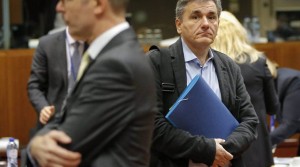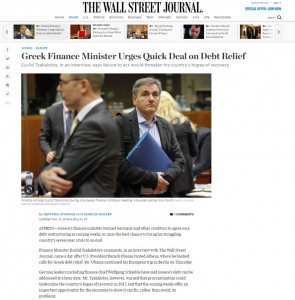In an interview to the Wall Street Journal, Greek Finance Minister Euclid Tsakalotos warned that Germany and the other lenders could miss a unique chance of ending the uncertainty in Greece’s struggling economy they refused to agree on a debt restructuring. From the Wall Street Journal:
Greece’s finance minister warned Germany and other creditors to agree on a debt restructuring in coming weeks, or miss the best chance to bring his struggling country’s seven-year crisis to an end.
Finance Minister Euclid Tsakalotos’s comments, in an interview with The Wall Street Journal, came a day after U.S. President Barack Obama visited Athens, where he backed calls for Greek debt relief. Mr. Obama continued his European trip in Berlin on Thursday.
German leaders including finance chief Wolfgang Schäuble have said Greece’s debt can be addressed at a later date. Mr. Tsakalotos, however, warned that procrastination could undermine the country’s hopes of recovery in 2017, and that the coming weeks offer an important opportunity for the eurozone to show it can fix, rather than avoid, its problems.“If we kick the can down the road and say ‘we will decide in two years’” about how to make Greece’s debt sustainable, then investors will also postpone decisions about investing in Greece, said Mr. Tsakalotos, a leading figure in Greece’s ruling left-wing Syriza party.
Amid rising political populism in Europe, the eurozone will only survive if it persuades voters it can solve its long-festering challenges, Mr. Tsakalotos said. “If it just postpones political decisions…then people will say it’s not working.”
Greece is approaching crucial weeks in negotiations with its creditors, the German-led eurozone and the International Monetary Fund. Athens is trying to show lenders that it is carrying out all of its agreed economic overhauls, including labor-market reforms and privatizations, and now deserves a restructuring of its mountain of bailout loans that would allow it to run smaller budget surpluses in the future.
Making Greece’s debt sustainable would also facilitate the country’s inclusion in the European Central Bank’s bond-buying program, the ECB has indicated—a step that Mr. Tsakalotos believes could happen by March 2017 and help to unlock a long-awaited economic recovery.
Urgent action is vital, he argued. No debt-relief agreement in December or January would mean no inclusion in the ECB’s program by March, Mr. Tsakalotos said. And that would prevent the country from returning to bond markets later in 2017 or early 2018. “It would be very short-sighted to stop the process that would bring us out of the program, which is within reach,” he said.
Germany and the IMF have been squabbling all year about when, and how specifically, to restructure Greece’s massive loans. Mr. Schäuble and other German officials are resistant to restructuring, except for minor tweaks, before Athens completes its tough program of economic reforms in 2018.
The IMF wants Europe to radically extend the lifetimes of Greece’s rescue loans, and to lock in the country’s interest rates at their currently low levels, in order to remove uncertainty over its future funding costs. Mr. Schäuble has said the issue can wait.Mr. Tsakalotos rejected the theory that Berlin is avoiding the Greek debt issue because of German elections next year. Debt relief wouldn’t translate into a noticeable cost for the average voter in Hamburg, Mr. Tsakalotos suggested. Rather, he said, Germany was displaying a lack of trust in Greece’s determination to continue with reforms if it gets debt relief. “At some stage in the relationship you have to trust the other person, because there are huge costs to lack to trust,” he said.
Failure to bring about the “virtuous circle” of a recovery boosted by debt relief, investor confidence, and ECB bond-buying, he said, could jeopardize Greece’s ability to exit its bailout as planned—“to the disadvantage of both us and our creditors.”
Greece’s economy is currently in a weak recovery, after losing about a quarter of its output and jobs since the financial crisis began. The country is the last in the eurozone that is still unable to fund itself on bond markets and relies on bailout loans.
Mr. Tsakalotos said that the combination of debt relief, ECB bond-buying and recovery could allow Greece to resume bond issuance in late 2017 or early 2018, before leaving its painful bailout era behind it from summer 2018.
Mr. Tsakalotos, an Oxford-educated Marxist economist who is viewed by Greece’s creditors as one of Syriza’s more pragmatic interlocutors, criticized the IMF for pressuring Greece to tighten its fiscal belt even further, rather than helping it find some breathing space with help from debt relief—which the IMF also wants. He said Greece’s negotiations needed a different sequence, with debt relief and austerity goals being worked out together.
Speaking just after the visit to Athens by Mr. Obama, Mr. Tsakalotos said he hoped Europe would continue to listen to the outgoing American leader, whose term ends in January.
The rise of populists in Western countries, epitomized by Donald Trump’s victory in the U.S. presidential election last week, is a warning to Europe’s left-of-center parties, Mr. Tsakalotos said.
The left needs to define “an agenda so that people can see their place in a more globalized world economy,” he said. Left-of-center parties such as Syriza have been “rather poor in responding” to the widespread economic insecurity of many working and middle-class voters in the face of rapid economic change, he said.source: WSJ.com
authors: NEKTARIA STAMOULI MARCUS WALKER
Ask me anything
Explore related questions






